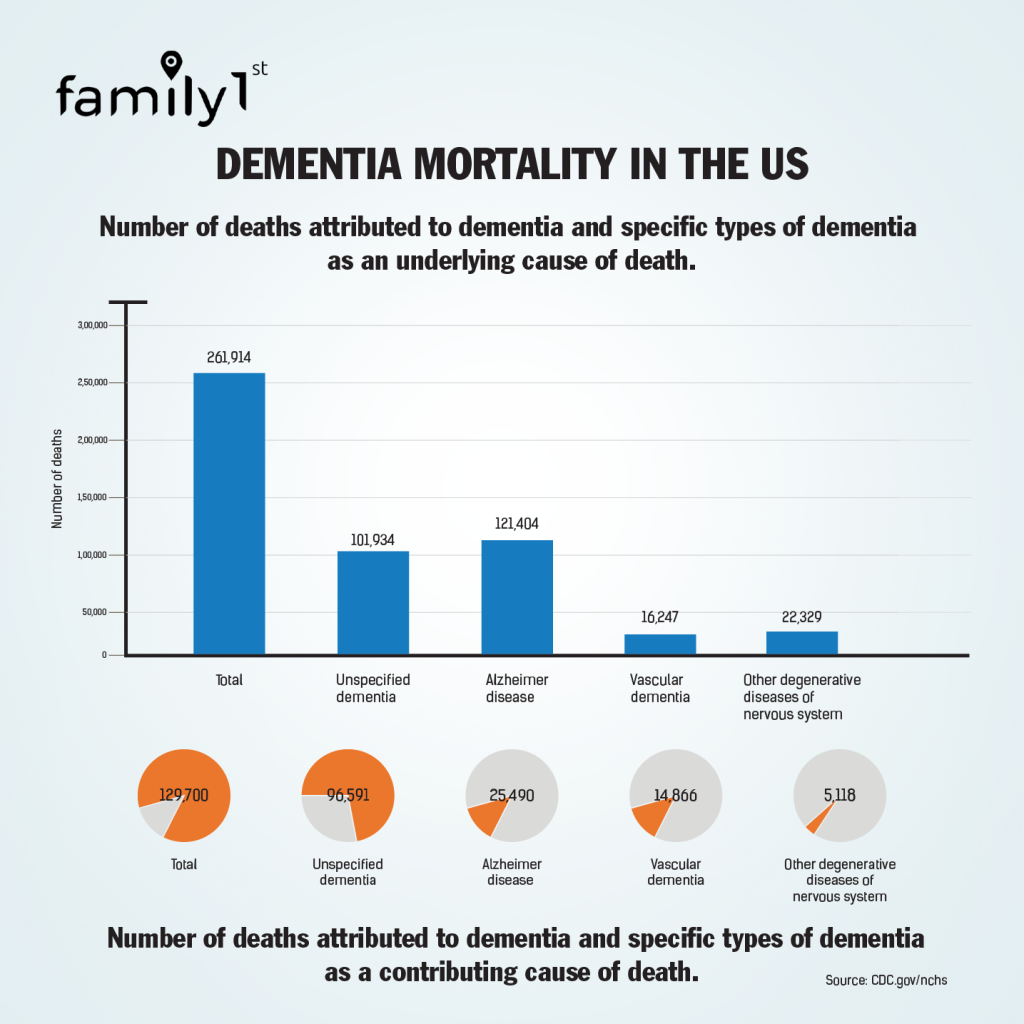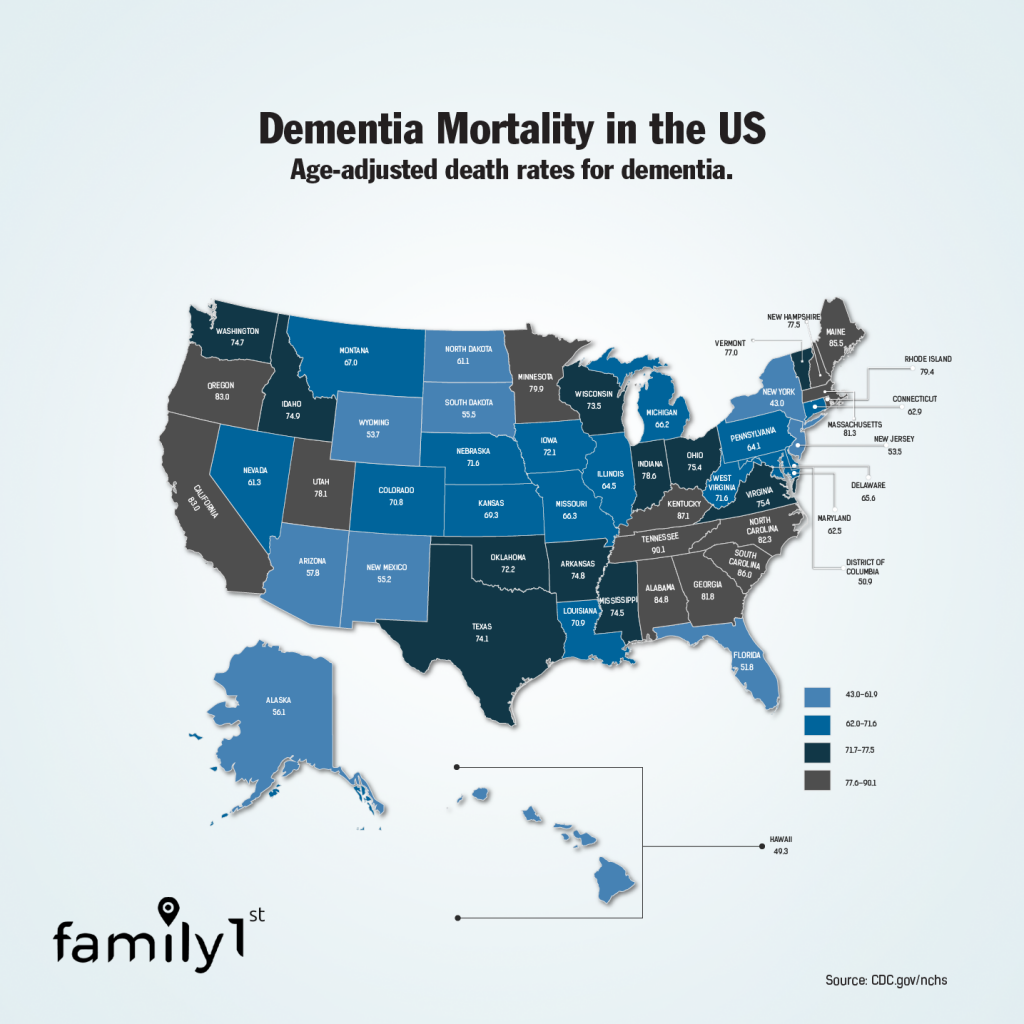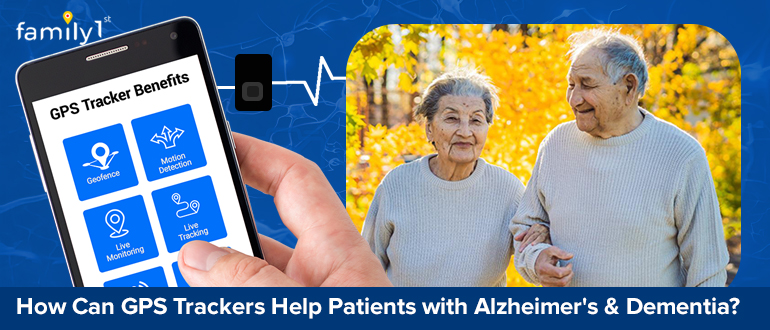Dementia is a medical condition that is characterized by memory loss, cognitive impairment, behavioral changes, and generally afflicts the elderly. Every year more than 10 million people worldwide get diagnosed with this condition, making it a challenge for them to lead normal lives. People with this condition are in a vulnerable and confused state of mind, often forgetting basic and important things in life, and as the condition gets worse, they may even forget drinking water and eating their meals.
Table of Contents
What is Dementia?
Dementia is not a disease but group of condition with several underlying causes, and in about 60-80% patients with this condition is caused due to Alzheimer’s. However, the list of medical conditions that can be an underlying cause for it is simply too long. People who are diagnosed with dementia suffer from gradual short as well as long-term memory loss. In the initial stages, a dementia patient may find it difficult to concentrate and form coherent sentences. But as the condition progresses, the patients become frail and require assistance in routine tasks like eating and walking. They fail to recognize their family and friends and are often unaware of their surroundings.
Dementia is of various types, having equally varied patterns of symptoms based on the changes in the brain brought about by degenerating nerves. For example, a person with Lewy body dementia can produce symptoms similar to Alzheimer’s disease, like impaired memory, but also have other complications such as visual or auditory hallucinations, insomnia, and difficulty in walking. Usually, the condition manifests in the elderly, especially those above 65 years of age. Although, there are cases of early onset of the disease in people between the age group of 30-50 years old, and it can be managed with early diagnosis and proper medication as well as diet.
Dementia is a slow disease, and in the beginning, the symptoms are so mild that the patient may not even notice it. However, as it progresses, the quality of life of the patient keeps declining, and they require round-the-clock care. Broadly, dementia is divided into six stages, although the time between various stages depends on gradual brain degeneration, as well as the existence of other medical conditions.
Stages of Dementia
- Very mild Cognitive decline: Forgetting commonly used words and phrases, as well as the location of objects like house or car keys or what the date and the day is.
- Mild Cognitive decline: Difficulty in driving, repeating words and phrases, forgetting people, declining task performance, problems with organizing and concentration, as well as loss of memory.
- Moderate Cognitive decline: This stage is also known as the early onset of dementia with symptoms like social withdrawal, denial, mood swings, unresponsiveness, and trouble carrying out routine tasks. This stage is also vital in the diagnosis of the condition to delay its progress and provide the patient with proper medication, therapy as well as care.
- Moderately Severe Cognitive decline: In this stage, the person with this condition requires continuous attention, either through a home caregiver or at a medical or community facility. This is because, in this stage, it is more likely for them to forget their own name and other personal details. This stage is also marked with extreme confusion and forgetfulness.
- Severe Cognitive Decline: In this stage, the patient has trouble sleeping, difficulty in recognizing their family and friends, increased delusion, severe anxiety, and therefore requires assistance with bathing, getting dressed, eating, walking, and more.
- Last-Stage Cognitive decline: This is the stage, where this condition is deemed terminal and the focus is given on making their remaining life pain-free. In this stage, the patient’s motor functions rapidly decline to make them bed-bound with an increased risk of several kinds of infections. Incontinence, severe memory loss and disorientation, immune system problems, repetitive movements, and strange or unusual behavior must all be managed during this stage as well.
Dementia not only affects an individual but also their loved ones. It is never easy watching someone you love slowly forget the life they had and become dependent on most basic tasks. However, researching about the condition and seeking help from professionals like therapists, nutritionists, and caregivers can help you make their remaining life easy and enriching.
Dementia Mortality
Dementia is the sixth leading cause of death in the United States. National Centre for Health Statistics (NCHS) conducted a detailed study and published a report on Dementia Mortality in the United States between the period of years 2000 and 2017. It was found that in 2017, 261,914 deaths were reportedly caused due to dementia, of which 46% were attributed to Alzheimer’s disease. Also, the age-adjusted death rate for dementia as an underlying cause of death was 66.7 deaths per 100,000 U.S. standard population. Age-adjusted death rates were higher for females (72.7) than for males (56.4). Death rates increased with age from 56.9 deaths per 100,000 among people aged 65–74 to 2,707.3 deaths per 100,000 among people aged 85 and over.
The NCHS report on dementia mortality is based on the data taken from death certificates throughout the country, where dementia is either contributing cause of death or an underlying cause of death. This is because the elderly age group generally afflicted with this condition often have several other medical complications like diabetes, heart diseases, or any other severe conditions. According to WHO, underlying cause refers to “disease or injury which initiated the train of events leading directly to death, or the circumstances of the accident or violence which produced the fatal injury”, and contributing cause of death refers to disease or injuries that contributed to the fatal outcome.
If we look at the data from 2017, for 261,914 deaths dementia was recorded as an underlying cause while 129,700 deaths were reported to have dementia as contributing cause. Furthermore, unspecified dementia was mentioned in 101,934 and 96,591 deaths as an underlying and contributing cause of death, respectively. Similarly, an underlying and contributing cause of 121,404 and 25490 deaths, respectively, was attributed to Alzheimer’s disease. The number of deaths with vascular dementia and another degenerative disease as the underlying cause is comparatively lesser, with 16247 and 22, 329 deaths, each; while the number of deaths with these two types of dementia being the contributing cause is 14,866 and 5118, respectively.

Also, the age-adjusted death rate for dementia as an underlying cause of death was 66.7 deaths per 100,000 U.S. standard population in 2017. Age-adjusted death rates for dementia were lower for males (56.4) as compared with females (72.7). Similarly, the age-adjusted death rates for dementia were higher in nonmetropolitan areas than in metropolitan areas (69.6 per 100,000 compared with 66.2). The study also indicated an increase in the age-adjusted death rate for dementia from 2000 to 2017 -from 30.5 deaths per 100,000 in 2000 to 66.7 in 2017. Age-adjusted death rates for all ages were steady from 2013 through 2016 and increased from 2016 to 2017.

The study also revealed that the number of deaths due to dementia varied across the country. However, such geographic differences could arise from variations in practices of recording data in death certificates (including specialized guidelines for coding dementia identified in some locations). Moreover, the huge difference in deaths in the metropolitan and nonmetropolitan areas could also indicate a lack of proper knowledge and awareness about Alzheimer’s and other types of dementia in the general population of the area. Quite often, the symptoms of dementia are simple written off as old-age problems without seeking a proper medical diagnosis.
Family1st – Supporting life with Dementia
There is an increasing awareness and acceptance of dementia with several ongoing types of research and study. Although there isn’t a cure for it yet, with early diagnosis, a good diet, therapy, care, and love, the progression of the disease can be slowed. Like any other severe medical condition, people with dementia also need support and love as well as understanding from their loved ones.
Several support groups help the patients as well as families and give them the guidance they need. After the initial stage, the patient requires constant monitoring, which has now become easier with portable GPS devices with advanced features like instant alerts and notifications, Geofencing, exact and real-time location, and more. Family1st offers special Senior GPS trackers that are compact, light-weight, and discreet. The device also comes with motion activation and allows you to set up a virtual geographic boundary known a Geofence, and sends you alerts on exit/entry of the same, making it the best tool to help and support people with dementia. It comes with 4G cellular technology, indoor tracking with Wi-Fi, and can be integrated with Alexa, ensuring that you are in constant touch with your elderly loved one. All our devices are curated for the security and safety of your family, offered at affordable prices, without compromising on effectiveness. We understand your need to keep your loved one safe and that is why our Senior GPS tracker comes priced at $13.95 with the lowest monthly subscription plan of $17.95 – the lowest in the market, to show our support for you and your family.
For more information regarding our Senior GPS tracking device and subscriptions, feel free to contact us. Our service associates are available 24/7 throughout the year.
Share this article with your friends to increase awareness of dementia and how it affects our elderly. If you have any tips or suggestions, let us know in the comments.









Next
Previous